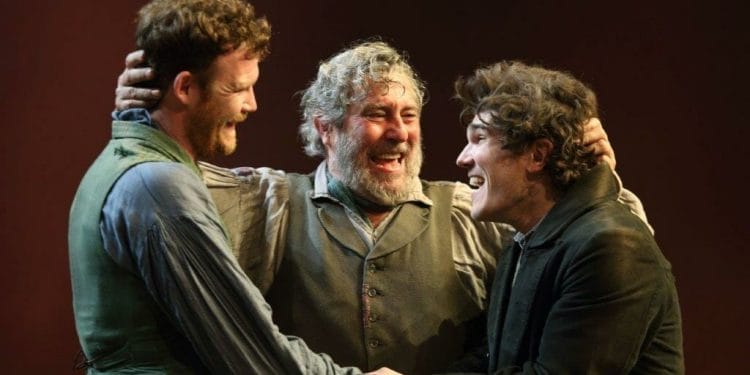 Brian Friel’s much-lauded 1980 play, Translations, returns to the National’s Olivier Theatre following a critically acclaimed run in early 2018. Today, on the day of its official opening Northern Ireland’s Stormont Assembly sat for the first time in almost three years, it came close to sitting last year, but the deal collapsed over a dispute about legislation surrounding the teaching of Irish language in schools.
Brian Friel’s much-lauded 1980 play, Translations, returns to the National’s Olivier Theatre following a critically acclaimed run in early 2018. Today, on the day of its official opening Northern Ireland’s Stormont Assembly sat for the first time in almost three years, it came close to sitting last year, but the deal collapsed over a dispute about legislation surrounding the teaching of Irish language in schools.
Translations, set in 1833 Donegal, demonstrates that this is by no means a modern dispute. As the British army undertake an exercise in mapping Ireland (six inches to the English mile), Anglicising the place names as they go, the Gaelic speaking community of Baile Beag are quietly trusting, or perhaps just fearful, of the intruders. The fact that neither group understand a word the other says is partly the cause, while the returning prodigal son, Owen, doesn’t always manage to translate truthfully.
Friel’s writing is masterful in these situations, to the audience both groups are speaking the same language, but to each other not a word is comprehended. It makes for some humorous interactions, particularly those featuring Lieutenant Yolland, who is so desperate to integrate with his gracious hosts.
Such integration seems impossible, certainly in Friel’s view, because Translations is as much about misunderstanding culture as it is about divergent language. There are of course overtones of colonialism, but this is portrayed through very individual stories, such as Sarah (Liadán Dunlea) who struggles to say her own name, or Jimmy Jack Cassie (Dermot Crowley) who revels in etymology, and is most comfortable exploring Latin and Greek.
Like language itself the play is often ambiguous, alongside the cartography a Hedge-School is to be made redundant in favour of a new National School, where everything will be free, but the only language taught is English. It represents an important time in Ireland’s history, and one that would have massive consequences for its future, very effectively highlighted in an almost chilling final moment.
Visually this play is striking. Director, Ian Rickson brings all the action forward, with the vast expanse at the back of the Olivier stage turned over to the rolling marshlands of rural Ireland, fog drifts dreamily over the contours of the landscape, and in the second act a harsh rain can be heard. The most dramatic of scenes are punctuated with a haunting score from composer Stephen Warbeck.
Ciarán Hinds returns to the production as Hugh, his growling tone masking a much softer and vulnerable character, which Hinds unveils gently throughout the play. Fra Fee takes over the role of Owen, bringing an enthusiastic gusto to the performance. Making his professional theatre debut, Jack Bardoe is wonderful as George Yolland, perfectly capturing the Englishman desperately trying to be understood by a community he wants to be part of. A scene between Yolland and Maire (Judith Roddy) sees a romance emerge where the only words that can be understood are place names, it is both touching and utterly delightful.
Translations deserves its reputation as a modern classic, and this production simply enhances that notion even further. It uses the mysteries of language to demonstrate that there are no easy answers, and leaves the audience to decipher the true meaning for themselves.























